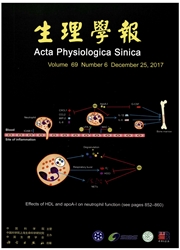

 中文摘要:
中文摘要:
摘要:本研究采用CCK-8增殖实验和测量神经球直径的方法探讨不同浓度高迁移率族蛋白B1(high-mobilitygroupbox1,HMGBl)对体外培养原代大鼠海马神经干细胞增殖能力的影响,同时通过使用C-Jun氨基端激酶(c-JunN-terminalkinase,JNK)高选择性抑制剂SP600125探讨其作用机制。结果显示,1和10ng/mLHMGB1分别培养48h$172h后,神经干细胞的CCK-8吸光度值和神经球直径与对照组比较有明显增加俨〈0.05),而其余浓度HMGBl培养基(0.01、0.1、100ng/mL)与对照组比较无明显差别(P〉0.05)。当HMGB1浓度为10ng/mL时,在神经干细胞增殖的同时P—JNK水平明显升高俨〈0.01);而10μmol/LSP600125明显抑制HMGB1促进神经干细胞增殖的作用,降低P-JNK水平(P〈0.01)。结果表明,低浓度(1~10ng/mL)HMGB1能够促进神经干细胞增殖,其机制可能是通过促进.INK的磷酸化发挥促增殖作用的。
 英文摘要:
英文摘要:
The cell counting kit-8 (CCK-8) proliferation assay and diameter measure of neurospheres were used to investigate the effect of high-mobility group box 1 (HMGB1) on proliferation of primary rat neural stem cells (NSCs) in vitro, and c-Jun N-terminal protein kinase (JNK) potent inhibitor SP600125 was used to study the mechanism. The results demonstrated that HMGB1 significantly increased CCK-8 absorbance values and neurosphere diameters at concentrations of 1 and 10 ng/mL at 48 h and 72 h (P 〈 0.05), and the other HMGB 1 concentration groups (0.01, 0.1, 100 ng/mL) showed no significant difference, compared with control group (P 〉 0.05). HMGB1 at l0 ng/mL significantly increased the NSCs proliferation accompanied by the rising ofphosphorylated JNK levels (P 〈 0.01), and 10 μmol/L SP600125 prevented these effects in HMGBl-cultured NSCs (P 〈 0.01). In conclusion, low concentration of HMGB1 (1-10 ng/mL) can increase NSCs proliferation, which may play a role by promoting JNK phosphorylation.
 同期刊论文项目
同期刊论文项目
 同项目期刊论文
同项目期刊论文
 期刊信息
期刊信息
